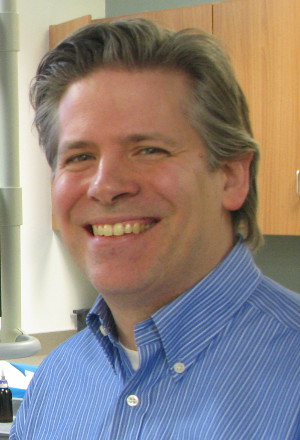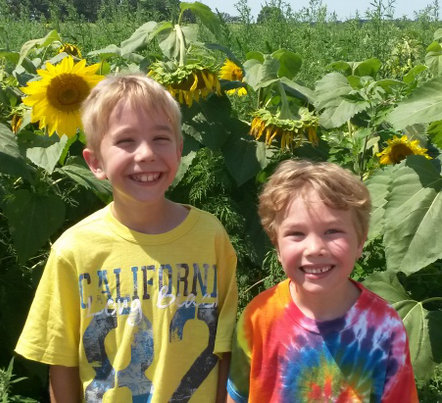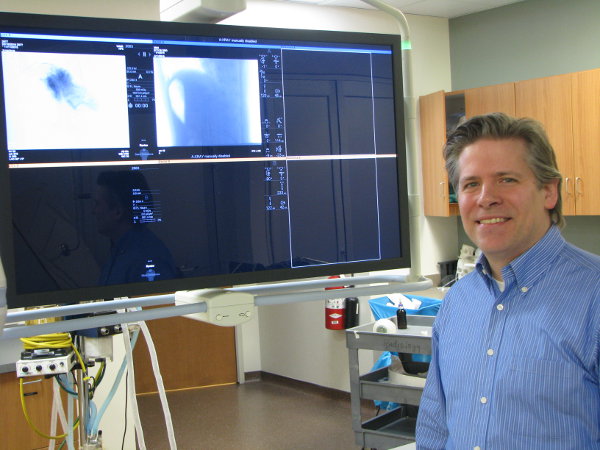 Timothy Szczykutowicz
Timothy Szczykutowicz
Michael Speidel
Assistant Professor of Medical Physics
“When you’re mentoring a student, you get to coach them through many different firsts: the first paper, the first conference presentation, and so on…that’s what I find the most rewarding.”
Can you tell us about your family?
I live with my wife Amy and our two boys, Freddy and Gus, who are in 4th and 1st grade. My wife is from the Madison area, I’m from Minneapolis. I met my wife as an undergrad.
What are some of your hobbies outside of work?
I play guitar – I’m not a performer, I just play for fun. I’m also a closet programming geek. I took some courses in college, but these days I just teach myself. The latest one I taught myself was Java, so I could help my boys modify a game called Minecraft. They love it. We can introduce a new character, a new material, a new sound – whatever they want.
What is something at the top of your bucket list?
My idea of fun is maybe a little different than most. I think it would be fun to witness the launch of a manned spacecraft. Right now there aren’t many opportunities to do this, but hopefully NASA will be able to get their program back on track before I kick the bucket.
In the Spotlight
What first drew you to the field of Medical Physics?
As an undergraduate here at the UW, I studied physics. I had an hourly job in Albert Erwin’s lab; he was a high-energy physicist who specialized in building electronic detection systems, and I was building circuit boards for him. He was a great mentor. As I was nearing the end of my physics degree, we got to talking about what it’s like to pursue a career in physics, and I realized it was pretty easy to get swallowed up. The experiments can be massive, with lots of institutions involved, and you may have just a tiny piece of that. Each experiment may take many years, and I was looking for something that was a little more immediate, with a little shorter turnaround. Professor Erwin suggested that I go across the street and check out the Medical Physics program, which I had never heard of. I ended up applying to grad school in both Med Physics and Physics, and I was accepted to both. I spoke to some people here, faculty who are still here, and they sold me on Medical Physics.
How has the field of Medical Physics evolved since you’ve started?
I’ve been in the field for about 20 years, which is long enough to see some changes. When I entered as a graduate student, the whole field felt a lot smaller. It was driven a lot by the development of new technologies – new medical imaging technologies, new radiotherapy technologies. Over time, as those technologies matured, there was more focus on finding new applications. For example if you look at computed tomography, there was this phase where manufacturers were coming out with systems with more slice coverage. That was a technological development phase. Then there was an exploration of new applications, cardiac imaging, for example. Now cardiac CT is a part of many common diagnostic workups. I think we’ll still see those kinds of new technologies, but they may be fewer and farther between. Our field is maybe becoming a little more introspective, we’re looking at what we have right now and asking ourselves what more we can do with it. For example in interventional cardiology, both x-ray imaging and echocardiography are available, and each has its own strengths – x-ray for looking at devices, and echo for looking at soft tissues. But doctors are forced to mentally integrate that information during a procedure. Medical physics can help by pulling those two modalities together to create a new imaging tool, a tool that works within the current clinical environment.
Michael Speidel in the lab
What are some challenges you’ve encountered and what have you done to get over them?
As a scientist, my job is to find challenges. If you’re working on an easy problem, you’re probably not in the right place. In a way a challenge is not just something to get over, or work around, it’s something to embrace.
What’s your favorite part about being a teacher and mentor to students?
I feel new to teaching; I’ve been teaching for a few years now, but I’m still improving. What I enjoy about it is that I have the opportunity of seeing our incoming graduate class in their first semester. They’re in that transition from an undergraduate to a medical physics graduate student, and it’s fun to watch them make that transition, and also to establish relationships with the students which then last for years. The mentoring is also rewarding. When you’re mentoring a student, you get to coach them through many different firsts. The first paper, the first conference presentation, and so on. They’re doing all the heavy lifting, all I’m doing is giving it a little structure.
Describe your journey here, from undergrad to professor. What’s it been like being at Madison the whole time?
It’s unusual for one person to see a single institution from all of those perspectives. I started as an undergraduate with a number of different hourly jobs. My first job was actually in the Department of Geography, photocopying books for professors. I also worked at the Union serving brats and beer. I went through graduate school here, then I was a post-doc, then a scientist, and now I’m faculty. It does give you an appreciation for the different experiences at the UW. I’m always aware of my student experience. I remember how I was once frustrated by a physics problem and sought help from the professor. We had trouble connecting, and you know sometimes that happens. I came away from that thinking that if I’m ever a professor, I should remember that feeling of just not ‘getting it’, and always try to see things from the student’s perspective.
Could you see yourself in any other career?
I like Medical Physics, I think it plays to my strengths. I like physics and math, and I’m a visual thinker, so working on medical imaging is a natural fit for me. Certainly I think about university settings versus other settings (hospital, industry). I think I could work in all of those settings.
If you had a million dollars, what would you do with it?
I think that money like that could be put towards supporting public science. In the past few years there has been a troubling erosion in the relationship between scientists in the university setting and the public, maybe a lack of communication from the university to the public about what’s going on here and how it can benefit the public. Public science is just the idea of scientific outreach, and also, getting members of the public to actually participate in scientific investigation where it’s feasible. Those kinds of activities are things that can allow people to reconnect to the university, to understand that there’s something important happening here.

